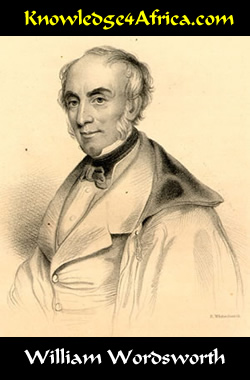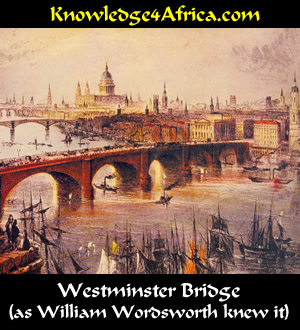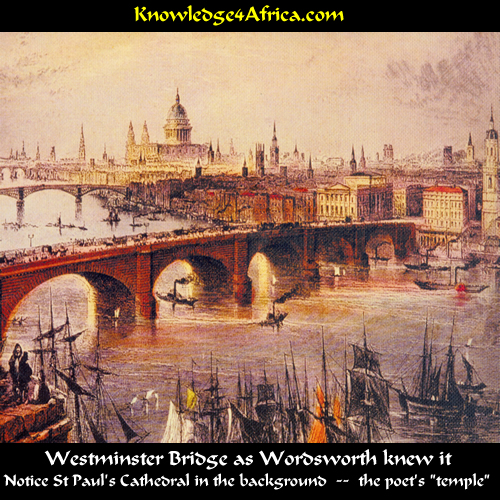|
READ THIS
The poet describes the beauty of the city of London at sunrise and his sense of awe when beholding so
much beauty.
The city, normally heavily polluted by the rising industrialism of the age, is today strangely free of the
smog.
It presents a spectacular scene: the ships, the buildings, the domed cathedrals, all shining in the early
morning sun in the strangely clear and clean air.
 ABOUT THE POET
ABOUT THE POET
William Wordsworth was born in 1770 at Cockermouth in the heart of the Lake District. His early
childhood was therefore spent in one of England's great wild places, playing in the hills around the lakes.
This memory would be immortalised within his many poems.
His mother died when he was eight, and his father when he was 13. Although he was left almost destitute,
his uncles helped the family through the crisis.
Wordsworth himself would be sent to school at Hawkshead, a small market town where the young boy
would further his love of the countryside. What's more, the little country school which he attended
encouraged him to develop his poetic talent.
Upon leaving school, Wordsworth attended Cambridge University to study law but, although he obtained
his degree, the poet had little interest in legal matters. His heart was in the wild places which became the
centre for his poetry.
He was eventually able to settle in the country where he became close friends with the great poet, Samuel
Taylor Coleridge. The two would collaborate for many years.
Wordsworth himself became a prolific writer of nature poems. "On Westminster Bridge" is one of
the great exceptions to his vision although it is the natural beauty of London on this rare, pollution-free day
which captured his imagination.
So great did Wordsworth's reputation become that he was made Poet Laureate for the United Kingdom
in 1843. He died in 1850 -- just seven years later -- at the age of 80.
Have you looked at the questions
in the right column?
|
TEST YOURSELF!
Read the left column and then answer
the following questions:
What city is being referred to in this poem? (1)

[Need help?]
What is the name of the river? (1)

[Need help?]
What about the River Thames?
|
Earth has not anything to show more fair:
Dull would he be of soul who could pass by
A sight so touching in its majesty.
- Rewrite in your own words: "Earth has not anything to show more fair". (2)

[Need help?]
"There is nothing on the Earth that is more beautiful."
|
- Whom does the poet describe as having a "dull soul"? (2)

[Need help?]
A person could walk by such majestic beauty without noticing it would have to be poor in spirit.
|
This City now doth, like a garment, wear
The beauty of the morning.
- What language devices or figures of speech are used in these lines? Be able to explain your answer.
(3)

simile
Yes, there is indeed a simile tucked away here! But is this the predominant figure of speech?
A simile is a comparison between two things but it usually can be recognised by use of the words
"as", "like" or "than".
Here are some examples of the use of a simile:
- He is as light as a feather;
- Her happiness is like a flutter of butterflies;
- The puff adder was fatter than a bag of pus.
|

metaphor
A metaphor is a direct comparison between two things. The object becomes the thing to which it is being
compared:
- "His happiness shone so brightly we had to wear shades" -- comparing his happiness to the
sun but saying that his happiness is the sun.
- "Her wit was so sharp it nearly cut off my left arm" -- comparing her wit to a sharp knife but
saying that her wit is a sharp knife.
In this poem, life is compared to wine in a bottle by saying that we actually drink life. Or the heart is
compared to an animal by saying that the heart is hungry. Or delight is compared to wine or another
liquid by saying that we drink delight, etc.
But is this the primary language device?
|

personification
This is indeed an example of personification!
Personification is a form of metaphor in which we give inanimate or non-human things the characteristics
of a human being:
- "The sun's face wrinkled in mirth as she peeped in through the bedroom window" -- the sun
is given the characteristics of a person.
- "The wind whispered her secret thoughts to the trees" -- the wind is given the characteristics
of a person.
- "The slow moon climbs" -- the moon is given the characteristics of a person.
In this poem, the city is being compared to a really beautiful woman who is wearing her flimsy clothing
which reveals her exquisite, shapely figure. The city also has a heart that is beating very slowly in sleep
at this hour of the morning.
|

alliteration
No, I'm afraid not! This is not an example of alliteration!
Alliteration is the repetition of consonants, usually those at the beginning of a word:
- He laid his head on the executioner's big black block;
- Double, double, toil and trouble.
|
Never did sun more beautifully steep
In his first splendour, valley, rock, or hill;
Ne'er saw I, never felt, a calm so deep!
The river glideth at his own sweet will.
- Explain in your own words: "Never did the sun more beautifully steep in his first
splendour". (2)

[Need help?]
"Never has the sun risen more beautifully at dawn."
|
- In what way can the river be said to glide at his own sweet will? (3)

[Need help?]
The Thames is a very slow, tranquil river. In Wordsworth's day, there would have been nothing to obstruct
its flow.
Because it is a tidal river, however, it flows one way and then the other, according to the direction of the
tide. And so it flows whichever way it pleases, gliding at its own sweet will.
|
The very houses seem asleep;
And all that mighty heart is lying still!
- The poet has made use of personification in these lines. Explain how he does it. (3)

[Need help?]
This is a continuation of the earlier image of the woman sleeping. The houses themselves are now
personified, and are sleeping.
The city is also once again personified, and has a heart which is beating very slowly while at rest.
|
What word BEST describes the TONE of this poem? Explain your answer. (4)

[Need help?]
What about AWE?
The poet has never seen so much beauty. Usually London would have been a polluted city, with the black
fog of smoke from the many fires hanging over it like a dark cloud.
On this morning, however, there is no pollution. The air is wonderfully clear. The poet is filled with awe
or amazement at the sight.
|
What type of sonnet is this? Justify your answer. (4)

[Need help?]
It's an Italian or Petrarchan sonnet. It is divided into an OCTAVE and a SESTET. The Octave and the
Sestet each has its own argument.
|
|





